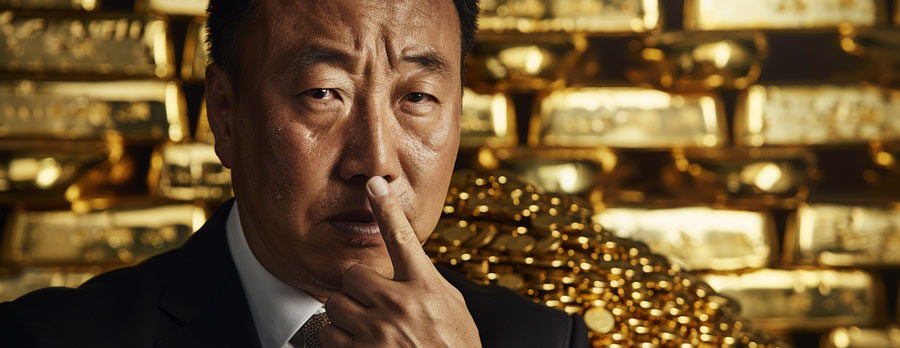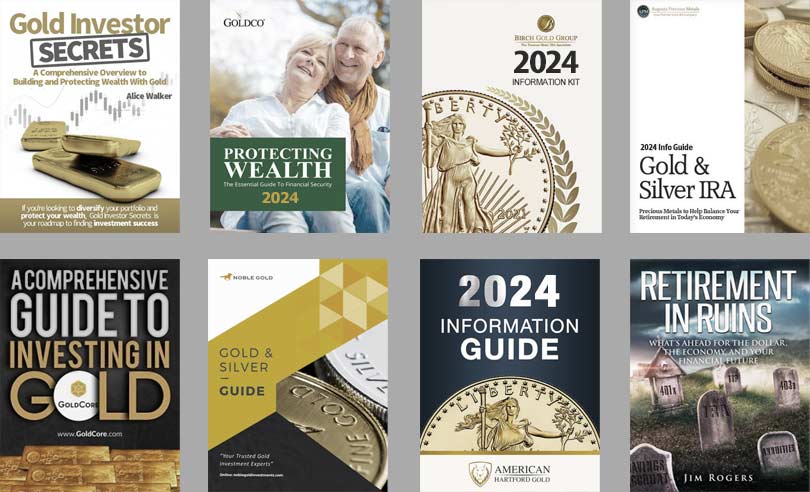
A few weeks ago, gold sold off on news that the People’s Bank of China didn’t add any gold to its reserves in May.
 Bullion.Directory precious metals analysis 21 June, 2024
Bullion.Directory precious metals analysis 21 June, 2024
By Mike Maharrey
Journalist, analyst and author at Money Metals Exchange
At the time, I called it a “kneejerk reaction,” and said the news wasn’t “a particularly good reason to sell gold.”
“The fact the PBoC didn’t buy any gold in May is certainly interesting, but it hardly counts as earthshaking news. Standing pat for one month doesn’t mean “China has stopped buying gold” as some news outlets framed it.”
Before the news, China had bought gold for 18 straight months. It ranked as the biggest central bank gold buyer in 2023. Officially, the People’s Bank of China added more than 300 tons of gold to its reserves during its buying spree.
“Officially” is the keyword.
Many analysts have long thought that China has far more gold than it officially reports.
Jim Rickards pointed out on Mises Daily back in 2015 that many analysts believe that China keeps several thousand tons of gold “off the books” in a separate entity called the State Administration of Foreign Exchange (SAFE).
The Official Chinese Gold Numbers Don’t Add Up
Chen Long is the founder and lead economist for Plenum. He’s also a respected journalist who writes extensively about China’s economy, financial markets, and government policies. Long recently wrote a piece for ThinkChina, a Singapore-based news site, after he ran the numbers on China’s gold holdings.
He found the official numbers simply don’t line up.
Long starts by pointing out that Chinese central bank gold purchases are a drop in the bucket compared to the country’s gold imports. The country imported over 1,400 tons of gold in 2023. This is despite the fact that China ranks as the world’s largest gold producer.
Chinese mines dug up 375 tons of gold in 2023.
In other words, there is a lot of gold flowing into China, and the country exports very little.
Only a handful of commercial banks hold licenses to import gold due to the PBoC’s tight regulation of the market. According to Long, 17 banks, including four state-owned institutions, reported gold holding of about 1,016 tons as of the end of 2023.
Interestingly, gold holdings by these commercial banks have been falling since around 2016.
Meanwhile, many commercial banks in China no longer sell gold to the public due to a commodities scandal a few years ago.
When you dig into the numbers, total official gold holdings by the PBoC, retail buyers, and the big commercial banks only rose by 431 tons last year. Total gold imports and production came in at 1,775 tons. That’s a gap of more than 1,300 tons.
Over the last two years, there have been about 2,700 tons of gold that is unaccounted for.
So, where in the world did that gold go?
Long said, “It is common to see gaps between these figures, but they are usually within a few hundred tons at most. Such a huge gap is rare.”
Where Is the Chinese Gold?
How do we account for this “missing” gold?
Long offered three possibilities.
Number one is that the People’s Bank of China bought more gold than it reported.
“If the PBoC has massively increased its gold position, it may want to withhold a full disclosure in order to avoid shocking the market.”
If all that missing gold is being held by the central bank, it would double its stated gold reserves to around 5,000 tons.
Long notes that the Chinese central bank has delayed reporting before. In June 2015, the PBoC disclosed a one-off increase in gold reserves of 621 tons. It’s highly unlikely the central bank bought all that gold in a single month.
A second possibility is China’s sovereign wealth fund holds some of that missing gold.
A sovereign wealth fund is a state-owned investment fund that holds surplus government revenues.
“After all, the sovereign wealth fund may not want to put all its money in U.S. dollars either, but the China Investment Corporation does not disclose how much gold it owns,” Long said.
A third possibility is that other numbers have been fudged. Chinese commercial banks may have overstated the reduction in their gold holdings while household gold purchases were understated.
“While the domestic banks have reported a big reduction of gold assets, some investors may have turned to the foreign banks who also have gold import licenses. They may have increased their gold holdings without making disclosures, although we doubt that such increases could completely offset the decline of gold holdings at the Chinese banks.”
With the lack of transparency in China, we’ll probably never know exactly where the gold went.
As Chris Powell recently wrote, “Mainstream financial news organizations don’t yet seem to notice that official statements about gold reserves are, to put it politely, not reliable.”
That means we’ll never know for sure just how much gold the Chinese government and its central bank hold.
But you don’t have to be a wild conspiracy theorist to think they probably have far more gold than they’re letting on.
Mike Maharrey


Mike Maharrey is a well-known author, journalist, financial analyst and writer at Money Metals Exchange, one of our top-rated US dealers and two-times winner of Bullion Dealer of the Year
He holds a BS in accounting from the University of Kentucky and a BA in journalism from the University of South Florida. Mike also serves as the national communications director for the Tenth Amendment Center and the managing editor of the SchiffGold website.
This article was originally published here
Bullion.Directory or anyone involved with Bullion.Directory will not accept any liability for loss or damage as a result of reliance on the information including data, quotes, charts and buy/sell signals contained within this website. Please be fully informed regarding the risks and costs associated with trading in precious metals. Bullion.Directory advises you to always consult with a qualified and registered specialist advisor before investing in precious metals.









 Material provided on the Bullion.Directory website is strictly for informational purposes only. The content is developed from sources believed to be providing accurate information. No information on this website is intended as investment, tax or legal advice and must not be relied upon as such. Please consult legal or tax professionals for specific information regarding your individual situation. Precious metals carry risk and investors requiring advice should always consult a properly qualified advisor. Bullion.Directory, it's staff or affiliates do not accept any liability for loss, damages, or loss of profit resulting from readers investment decisions.
Material provided on the Bullion.Directory website is strictly for informational purposes only. The content is developed from sources believed to be providing accurate information. No information on this website is intended as investment, tax or legal advice and must not be relied upon as such. Please consult legal or tax professionals for specific information regarding your individual situation. Precious metals carry risk and investors requiring advice should always consult a properly qualified advisor. Bullion.Directory, it's staff or affiliates do not accept any liability for loss, damages, or loss of profit resulting from readers investment decisions.

Leave a Reply